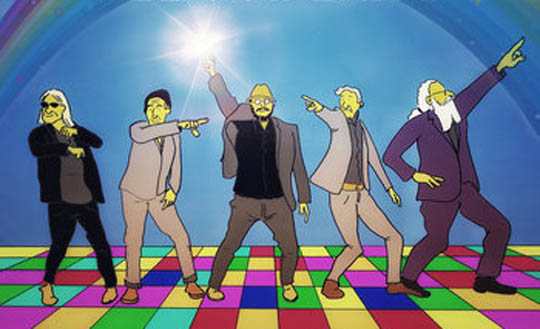|
A simple electric guitar pattern, over which the fiddle plays a phrase, develops as it repeats. Then in with the full band, big chunks growing into a huge loping riff and screaming guitar, before subsiding to the opening fiddle phrase and guitar pattern.
It is a satisfying opening to the first album in a long time – ten years, in fact – from one of the leaders of Sweden’s folk-rock phase of the 1990s, and it’s a full-blooded, energizing and very welcome return, up there with their finest.
As the booklet says, "Hoven Droven is still Pedro Blom (bass), Jens Comén (saxophones), Björn Höglund (drums and percussion), Bo Lundberg (guitars), Kjell-Erik Eriksson (fiddle)." That same five have been together since their first album in 1994, though sometimes they’ve been a six-piece with either trumpeter Gustav Hylén or organist Janne Strömstedt, and indeed Strömstedt on harmonium is one of the guests here, together with fiddlers Adrian Jones and Peter Roos, cellist Katarina Bergner-Åhlen, and producer-engineer Johan Arveli on ‘guitars and various noises’.

|
|
Moving on from that opener, "Amerikalinien," there’s "Spackarull’n," which expands over a Bo Diddley kind of beat with the sort of astringent, honking electrified fiddle sound that we haven’t heard much of since early Steeleye Span and the development of improvements in fiddle mics and transducers, but that has its own rather pleasing character. There is a change of pace for "Jensine" where a wiggling fiddle line is joined by soprano sax over a spacious slow-swinging accompaniment, moving into a limpid cool-jazz sax break.
Three tracks are the ‘trad’ of the title. "Evertsberg" isn’t a paean to the IKEA sofa of that name, it’s Hoven Droven’s version of the old bridal march from that village (which is also the birthplace of the great singer/fiddler Lena Willemark), in Dalarna’s Älvdalen. "Isak-Anders" is from the repertoire of Älvdalen master barrel-maker and fiddler Isak-Anders Persson (1849-1917), and the polska "Stugun" from that of fiddler Nils Petter Pettersson (1876-1944) and named after the Jämtland village of his birth.

|
|
The other eight are compositions, all by Eriksson except Comén’s anthemic "Polska Från Hallonbergen" which is led by misty sax over liquid-chiming phased guitar, with a soaring fiddle break. These new tunes stand as equals alongside the old ones that have been shaped by years of folk-process. "Maraakéspolskan," as much here, is a reminder of the glory of the heyday of Swedish folk-rock as well as the acoustic massive Filarfolket . It’s an approach to traditional music that waned somewhat before its potential had been fully explored, and, as this album shows, still has much to offer. "Fela Inferno" (that’s ‘fiddle inferno’ rather than a reference to the wild Nigerian band-leading saxophonistist) has knowing echoes of another period and realm of popular music, disco.

|
|
The closer, "Spoven" (the curlew) is a joyfully infectious tune and rhythm likely to motivate dancing around the room. Its booklet note says "Summer always begins with the upward shirping of the Aflospov." What a fine word is 'shirping!' Much more evocative of a curlew’s lonely call than chirp. I intend to add it to my vocabulary.
Though this is a Swedish band, Trad is on the Norwegian label Heilo, a very fine, pioneering and prolific traditional music label that was owned and run single-handedly by the late Hallvard Kvåle (d.2006), who was a fiddler himself; it’s now under the wing of Grappa. All Heilo albums end with the evocative piping, indeed shirping, not of the curlew but of another wader, the beautiful golden plover whose Norwegian name is heilo, and here, as ever, it makes a lovely coda.
Find the band online.
Photo: Marlene Nilsen
Further reading:
Lena Willemark: Blåferdi
Puuluup: Viimane Suusataja
|
